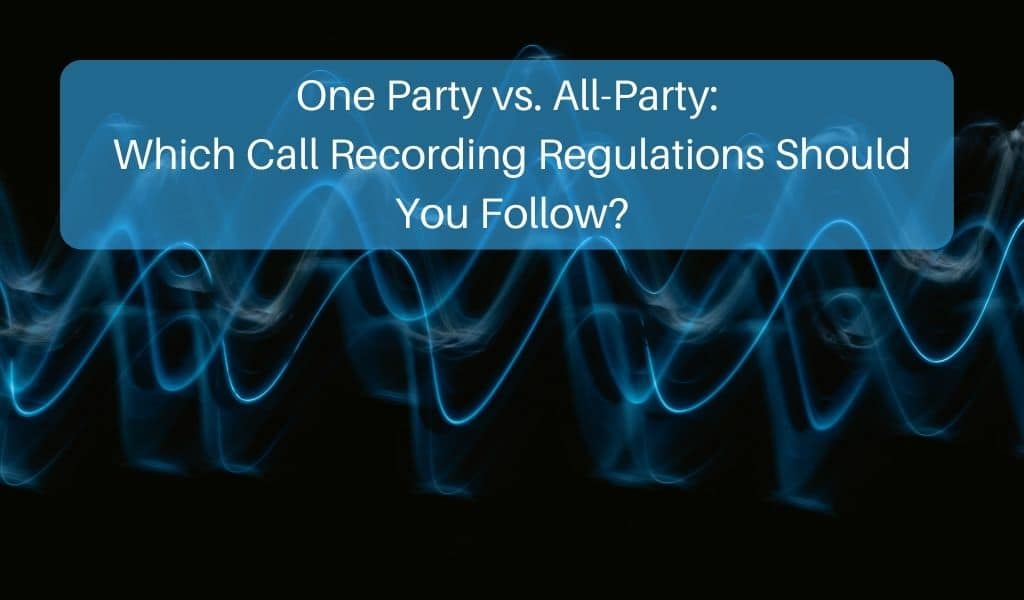Different states have different call recording regulations. Know which ones you need to follow to avoid any legal issues.
Recording calls can be an excellent way to capture customer communications for business use and training purposes. However, there are call recording regulations in place that you need to follow.
Federal call recording regulations are pretty straightforward: At least one-party on the call must consent to the call being recorded.
To dig deeper, here’s a state-by-state guide you can use to ensure you’re not stepping outside the law when recording your phone calls for business purposes.
See how Call Logic can change the way you do business by streamlining workflows and so much more. Check out a free demo to learn more!
Call recording regulations: One-party consent states
One-party consent generally means that at least one party of the phone conversation must consent to the recording, even if that one party is the one doing the recording.
Alabama
At least one party must consent to record a phone conversation; otherwise, recording is considered a misdemeanor.
Alaska
It is also a misdemeanor in Alaska to record a phone call without at least one party’s consent.
Arizona
Recording phone conversations without at least one party’s consent is considered a felony, and there may be civil liability as well.
Arkansas
Here recording a call to which you are not a party is considered a misdemeanor, but there are no other call recording regulations beyond the federal law.
Colorado
Recording a call without one-party consent is a felony in Colorado.
District of Columbia
It is illegal to record phone conversations in D.C. without the consent of at least one party under penalty of fine or imprisonment, or both. Civil liabilities may also apply.
Georgia
Fines or imprisonment may occur if recording calls without at least one party’s consent. The violation is considered a felony under Georgia law.
Hawaii
One-party consent is required to record phone conversations in Hawaii. Failure to obtain one-party consent is a felony.
Idaho
Fines, imprisonment, and possibly civil liability are the potential punishments for recording a phone call in Idaho without one-party consent.
Indiana
One-party consent is required in Indiana. Violators may be subject to fines, imprisonment, and/or civil liability as this is considered a felony offense.
Iowa
It may be a misdemeanor or a felony to record phone calls without one-party consent, depending on which law is applied.
Kansas
Kansas call recording regulations require one-party consent, with violations considered a misdemeanor and potentially subject to civil liability.
Kentucky
Recording a phone call here is a felony without consent from at least one party.
Louisiana
At least one party must consent to recording a phone call under penalty of fines, imprisonment, and/or civil damages.
Maine
Call recording regulations in Maine require one-party consent, or violators may face fines, imprisonment, and/or civil liability.
Minnesota
One-party consent is enough in Minnesota as long as there is no criminal intent when making the phone recording.
Mississippi
Same as Minnesota.
Missouri
Also the same as Minnesota and considered a felony in Missouri.
Nebraska
Another just like Minnesota, except that a first offense may be considered a misdemeanor in some circumstances.
New Jersey
One-party consent is passable for recording phone calls without criminal intent. Illegal recording is considered a crime in the third degree and may also result in civil liability.
New Mexico
Call recording regulations require one-party consent. Violations are misdemeanors and may result in civil liability as well.
New York
Failure to obtain one-party consent makes recording phone calls a felony in New York.
North Carolina
Same as New York, except that civil liability may also apply to violators.
North Dakota
One-party consent is enough here unless there is criminal intent when recording the conversation.
Ohio
Same as North Dakota, except that civil liabilities may apply.
Oklahoma
Same as North Dakota.
Oregon
One-party consent is enough for telephone conversations, but in-person conversations require all-party consent.
Rhode Island
One-party consent is enough in Rhode Island to record a phone conversation as long as there is no criminal intent.
South Carolina
Failure to obtain one-party consent here results in a felony punishable by imprisonment and/or civil liability.
South Dakota
Phone recordings here are illegal without the consent of at least one party.
Tennessee
One-party consent is enough in Tennessee as long as there is no criminal intent. Violations may result in civil damages, an injunction, and/or a restraining order.
Texas
One party must consent to recording a phone call, and there can be no criminal intent in recording.
Utah
Same as Texas.
Virginia
Same as Texas.
West Virginia
Same as Texas.
Wisconsin
Same as Texas.
Wyoming
Same as Texas with varying penalties.
Call recording regulations: All-party consent states
All-party consent means that everyone on the call must consent to being recorded. These are the states that require all-party consent.
California
California call recording regulations include all-party consent where there is a reasonable expectation of privacy or notification of the recording to all parties by way of an audible beep at specific intervals.
Connecticut
While one-party consent satisfies criminal law in CT, civil law requires all-party consent either in writing or orally at the start of the call.
Delaware
There is conflicting guidance in Delaware, so the safest thing to do is to stick with all-party consent.
Florida
All-party consent is required. Violations are a misdemeanor or third-degree felony and may result in civil liability.
Illinois
All-party consent is required wherever there is a reasonable expectation of privacy.
Maryland
All-party consent is required wherever there is a reasonable expectation of privacy, but recording with criminal intent under any circumstances is illegal in all cases.
Massachusetts
All-party consent is required. Violations are felonies.
Michigan
Though all-party consent is required by law, one court interpreted the law as only requiring one-party consent. To be safe, all-party is the best way to go.
Montana
All-party consent is required except in special circumstances involving public officials or entities or if a warning is given about the recording.
Nevada
The statute here only requires one-party consent. However, the Nevada Supreme Court ruled that all parties must consent, so all-party is the way to go here.
New Hampshire
All-party consent is required. However, consent is implied if all parties are notified of the recording, and they participate anyway.
Pennsylvania
All-party consent is required under penalty of civil liability.
Vermont
Vermont doesn’t have call recording regulations, so the safest thing to do is get all-party consent even though federal law only requires one party.
Washington
Recording calls requires all-party consent in Washington; however, consent is implied if a reasonably clear announcement about the recording is made at the start of the call and all parties still participate.
It’s worth pointing out that some regulations, such as the TCPA and the Telemarketing Sales Act require you to follow the laws in the state to which you are calling. There is some ambiguity as to whether that applies to recording calls. For instance, if you’re calling from a one-party consent state such as New York to someone in a two-party consent state like California, the law is not clear on which state regulations you need to follow. It’s always better to go with caution, however. Given that it’s a felony in some states to record calls without proper consent, we’d suggest all-party consent is the only way to go.
Record calls, train employees, track client information, and so much more with Call Logic. Sign up for your free demo today!

